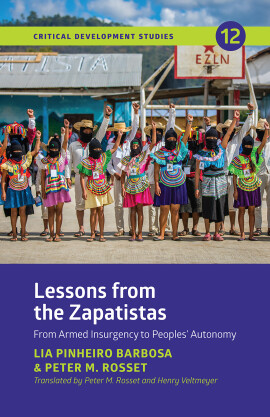
Digital Development
Stories of hope from health and social development
Sundeep Sahay, Arunima Mukherjee, Geoffrey Walsham, Thomas Hylland Eriksen
There is growing global consensus that the Information and Communication Technologies (ICTs), and particularly the Internet, are providing a new framework and huge opportunities for economic, political and social development. This book explores case studies across India, Kenya, Guatemala, Sri Lanka, and global, comparative settings, and asks what positive impact ICT applications (Health Information Systems, Pandemic response systems, Early Warning and Response Systems, Hospital Information System and Smartphone based Apps) can have on today’s most pressing challenges. The authors use this lens to discuss a wide range of issues facing communities around the world, including public health and pandemic management; the mitigation of ethnic violence and violence against women; the emergence of an informal economy; and the displacement of refugees.
The case studies are analyzed through a wide means-process-ends framework, which is complemented with micro-level observations of people’s experience, such as empowerment, agility and trust within communities. This interplay between the macro framework and micro concepts helps us to understand how and why digital interventions can contribute to positive outcomes, and which stories of hope may inspire other development channels. The lessons inside the book’s pages are important for anyone involved in the research around digital visions for development, as well as for those involved in practical aspects of policy building and practice when deploying these technologies.
Published: 2022
Pages: 300
eBook: 9781788532075
Paperback: 9781788532068
Hardback: 9781788532051
The case studies are analyzed through a wide means-process-ends framework, which is complemented with micro-level observations of people’s experience, such as empowerment, agility and trust within communities. This interplay between the macro framework and micro concepts helps us to understand how and why digital interventions can contribute to positive outcomes, and which stories of hope may inspire other development channels. The lessons inside the book’s pages are important for anyone involved in the research around digital visions for development, as well as for those involved in practical aspects of policy building and practice when deploying these technologies.
| 1. The hope of ICTs building a better world | |||
|---|---|---|---|
| 2. Enabling empowerment and platforms for learning: ICTs for strengthening maternal and child health in India | |||
| 3. Empowerment of displaced persons through the smartphone | |||
| 4. Building resilience to strengthen HIS response to pandemics: Case study from Sri Lanka | |||
| 5. Enabling sustainability qualifiers of health management information systems: Case study from Odisha, India | |||
| 6. Building citizen trust in public health systems: Hospital information systems in India | |||
| 7. Mobile payments as a means to an end | |||
| 8. ICT-enabled counter networks for peace: Mitigating violence in Kenya | |||
| 9. Enabling spaces for conversation: Engaging with violence against women in Guatemala | |||
| 10. Implications for theory, policy, and practice |
‘The authors – all leaders in the field of information technology for development – take readers on a journey across a series of in depth cases zooming in on stories across geographies and technologies assessing the broad contribution of digitalisation. The lessons are diverse grounded in the domains of health, maintaining peace, gender violence, refugees and payments. This book is unique in its depth and breadth and is both insightful and inspiring.’
Professor Brian Nicholson, Alliance Manchester Business School, University of Manchester, UK
‘This book makes a unique contribution to the ICTD field of study presenting a compendium of stories about how digital technologies in the hands of citizens can promote socioeconomic development. Apart from providing rich insights about the socially-embedded nature of ICTD interventions, these stories constitute locally-grounded theories of change to guide further research and practice on digital development.’
Shirin Madon, Associate Professor of Information Communication Technologies and Socioeconomic Development, London School of Economics
‘This is a must-read for anyone committed to understanding how information and communication technologies have become integral to global economic, political, and social development. Based upon a collection of case studies, it provides an opportunity to learn from those involved in the practices that are making a difference. These authors have made a positive contribution to our understanding of digital development, offering valuable insights for scholars, policy makers, and practitioners.’
Susan Scott, Professor of Information Systems, Department of Management, London School of Economics
Professor IFI, University of Oslo
Postdoc IFI, University of Oslo
Emeritus Professor of Management Studies, Cambridge University
Professor SAI, University of Oslo
What role does “hope” play in ICT4D research?
Sahay, Sundeep
The Information Society, Vol. 40 (2024), Iss. 1 P.54
https://doi.org/10.1080/01972243.2023.2279966 [Citations: 2]Building hope for the poor with digital services: Providing prosperity, justice, and dignity for ALL
Barrett, M.
Liyala, S.
Oborn, E.
Prince, K.
Africa Journal of Management, Vol. 10 (2024), Iss. 1 P.75
https://doi.org/10.1080/23322373.2024.2316508 [Citations: 2]Digital Development: Reimagining Research Beyond ICT4D
Sahay, Sundeep
Srivastava, Shirish C.
Barrett, Michael
Davison, Robert M.
Madon, Shirin
Schlagwein, Daniel
Brown, Irwin
Sarker, Suprateek
Information Systems Research, Vol. 36 (2025), Iss. 3 P.1269
https://doi.org/10.1287/isre.2025.editorial.v36.n3 [Citations: 0]





